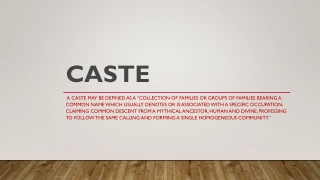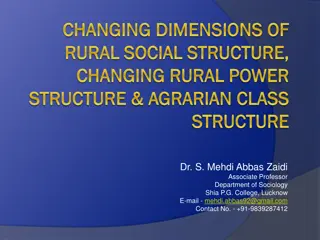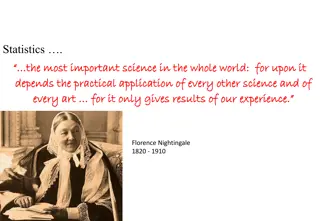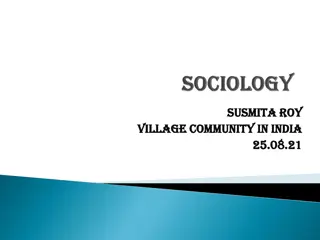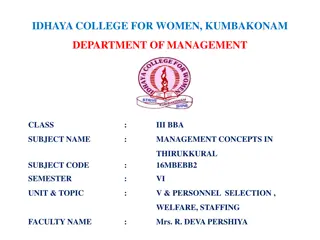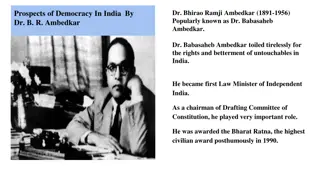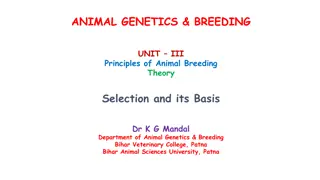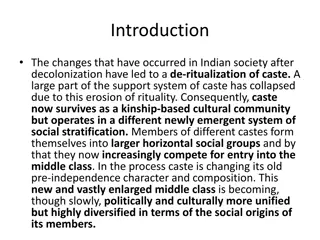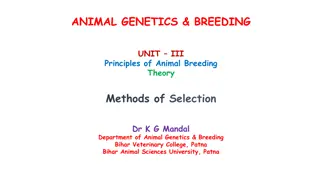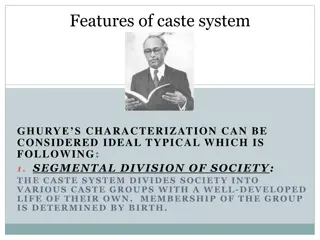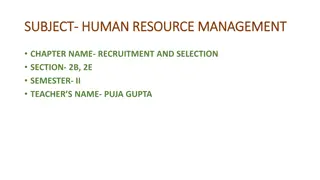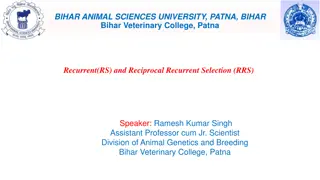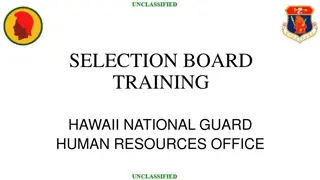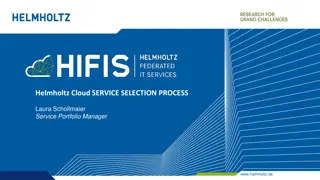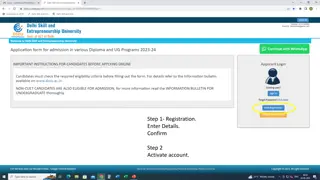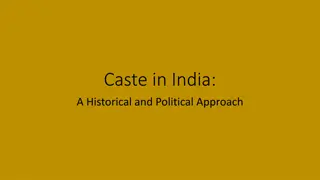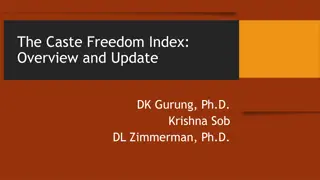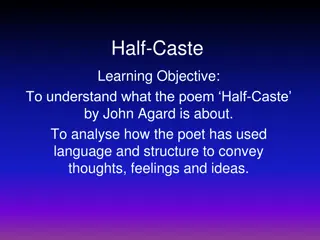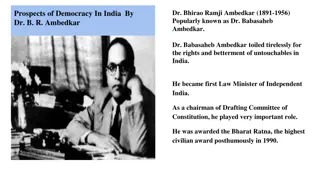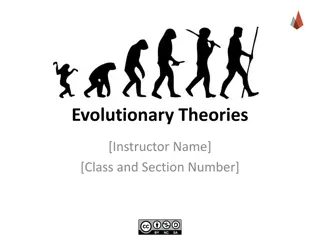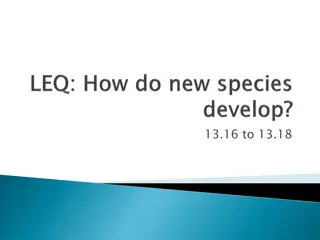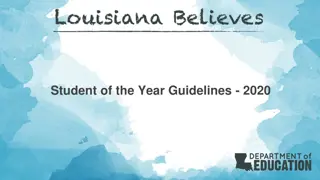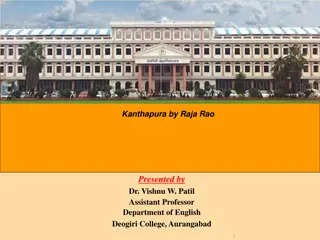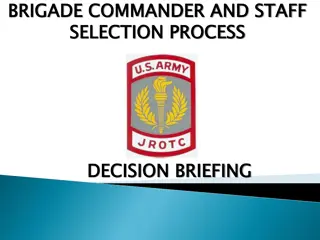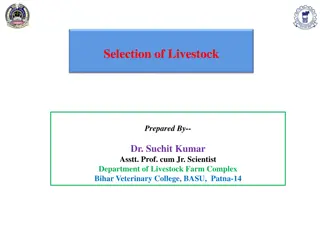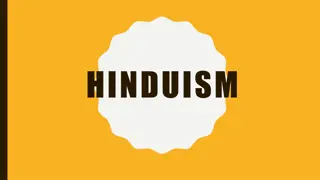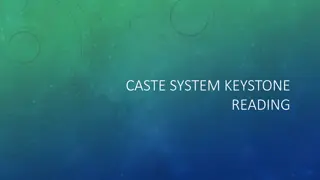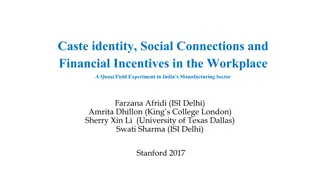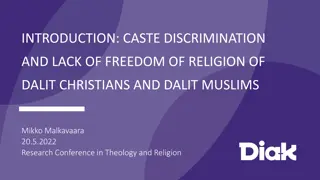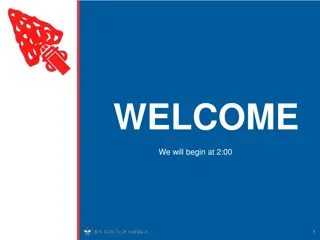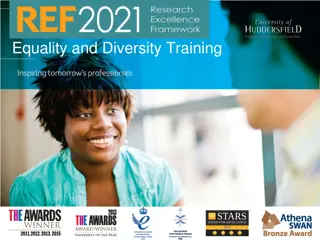INDIAN ARMY AGNIVEER SELECTION PROCESS 2024
https:\/\/youtube.com\/shorts\/3Errhs-10LM?si=gWwlhucXivM1v02s\n\n\n\nIndian Army Agniveer Selection Process 2024\nManasa Defence Academy is proud to offer the best Army training programs, including the NDA Crash Course (6 Months) and NDA Advance Course (1 Year). In this blog post, we will explore t
3 views • 1 slides
Overview of Caste System in India
The caste system in India is a social structure defined by hereditary groups, each with specific occupations, rules, and traditions. Membership is based on birth, leading to a rigid hierarchy and limited mobility between castes. Endogamy, occupation, commensality, and purity are key features that sh
0 views • 17 slides
Changing Dimensions of Rural Social Structure in India
Rural social institutions in India have deep historical roots, encompassing family, kinship, caste, class, and village structures. This complexity reflects a wide range of social norms, values, roles, and obligations. Changes in the caste system and the practice of jajmani are also highlighted, show
2 views • 21 slides
Understanding Logistic Regression Model Selection in Statistics
Statistics, as Florence Nightingale famously said, is the most important science in the world. In this chapter on logistic regression, we delve into model selection, interpretation of parameters, and methods such as forward selection, backward elimination, and stepwise selection. Guidelines for sele
4 views • 33 slides
Iravati Karve - Renowned Anthropologist and Sociologist
Iravati Karve (1905-1970) was a distinguished anthropologist, sociologist, educationist, and writer known for her work on kinship, Indian culture, and the Mahabharata. Through her major works and analysis of kinship organization in India, Karve made significant contributions to understanding regiona
2 views • 14 slides
How to apply for a Community Certificate in Tamil Nadu
A community certificate is a document serving as proof that an individual belongs to a specific category or caste. The main reserved categories in the country are Scheduled Caste (SC), Scheduled Tribes (ST), and Other Backward Classes (OBC). This certificate can be applied in the E-Sevai portal.\nTo
3 views • 5 slides
BC Caste population as per Ambasankar Commission in India
In India, the term \u201cBackward Classes\u201c(BC) refers to socially and educationally Backward groups. In India, they come to OBC at the National level.\nBC population Count as per Ambasankar Commission:\nNote: The Following are the Communities that are in the Central Government list of \u201cOBC
6 views • 5 slides
MBC Caste population as per Ambasankar Commission in India.
MBC in the Indian context typically refers to \u201cMost Backward Classes.\u201d This is a category used in some Indian states to identify communities that are considered socially and educationally Backward.\nMBC population Count as per Ambasankar Commission\nNote: The Following are the Communities
3 views • 5 slides
Guidelines for Upholding Rights of LGBTQ
In light of evolving societal norms and the imperative to safeguard the rights and dignity of LGBTQ individuals and inter-faith\/inter-caste couples, the Supreme Court has given guidelines for the handling of habeas corpus petitions and petitions for police protection.\nBackground:\nRecent instance
9 views • 4 slides
How to apply for a Community Certificate in Tamil Nadu
A community certificate is a document serving as proof that an individual belongs to a specific category or caste. The main reserved categories in the country are Scheduled Caste (SC), Scheduled Tribes (ST), and Other Backward Classes (OBC). This certificate can be applied in the E-Sevai portal.\nDo
6 views • 5 slides
how to get Inter caste Marriage Certificate in Tamil Nadu
other spouse is from a Non-Scheduled Caste. This type of marriage often requires special considerations and documentation due to the different social categories of the spouses.\\nDocuments Needed:-\\nTo request an Inter-caste Marriage Certificate in Tamil Nadu, you must provide the following documen
5 views • 5 slides
Socio-Cultural Features of Village Community in India
The traditional village community in India was historically self-sufficient, with its own production and consumption units. Over time, changes have led to increased interactions among villages, diminishing self-sufficiency. Factors like multi-caste populations, markets, pilgrimages, and pilgrimages
3 views • 18 slides
Management Concepts in Personnel Selection and Welfare at Idhaya College for Women, Kumbakonam
The Department of Management at Idhaya College for Women in Kumbakonam offers insights into the importance of personnel selection in organizations. The process of personnel selection involves hiring individuals with the required qualifications to fill vacant positions. Proper selection and placement
0 views • 20 slides
Challenges of Caste System and Democracy in Indian Society
Dr. B.R. Ambedkar discusses the prospects of democracy in India, highlighting the challenges posed by the caste system. He emphasizes the need for true societal unity and cooperation to achieve democracy beyond a mere form of government. The Caste system's deep-rooted inequality and lack of shared e
0 views • 10 slides
Principles of Animal Breeding: Selection and its Basis
Selection in animal breeding involves choosing the best individuals to improve specific traits. Criteria for selection include individual merit, competitive exams, and interviews. Selection of farm animals focuses on non-random reproduction of genotypes. Types of selection include natural and artifi
1 views • 40 slides
Evolution of Caste in Post-Colonial Indian Society
Changes in Indian society post decolonization have led to the de-ritualization of caste, resulting in a shift towards a kinship-based cultural community operating in a new system of social stratification. Secularization of caste has detached it from ritual hierarchy and aligned it with competitive d
5 views • 10 slides
Principles of Animal Breeding Theory and Methods of Selection
Animal breeding involves selecting for desirable traits to improve the overall merit of animals. Methods such as tandem selection and multi-trait selection are used to enhance genetic progress. Economic value, genetic significance, and selection criteria play important roles in the breeding process.
1 views • 16 slides
Features of Caste System: Ghurye's Characterization
The caste system, as characterized by Ghurye, features segmental division of society determined by birth, hierarchy based on purity, restrictions on feeding and social intercourse, civil and religious privileges/disabilities, lack of occupational choice, and severe restrictions on inter-caste marria
2 views • 6 slides
Recruitment and Selection Process in Human Resource Management
Recruitment and selection are vital processes in human resource management. Recruitment involves attracting candidates for job positions within an organization through various sources, both internal and external. The steps in recruitment include planning, strategy development, searching, screening,
0 views • 6 slides
Understanding Selection Strategies in Animal Genetics and Breeding
Genes influence traits through Additive Gene Action (AGA) and Non-Additive Gene Action (NAGA) in animal breeding. Recurrent Selection (RS) and Reciprocal Recurrent Selection (RRS) play crucial roles in improving animals. Selection for General Combining Ability (GCA) and Specific Combining Ability (S
0 views • 16 slides
Selection Board Training and Human Resources Responsibilities in Hawaii National Guard
This document outlines the agenda for the Selection Board Training conducted by the Hawaii National Guard Human Resources Office. It covers recruitment, selection processes, decision-making, and job offer responsibilities. References to relevant U.S. Codes and Acts are provided. The structure of the
0 views • 48 slides
HelmholtzCloud Service Selection Process Overview
The Helmholtz Cloud Service Selection Process is detailed through service surveys, iterations, criteria types, and exclusion processes. Service providers deliver data, weighting and selection criteria are applied, and candidate services are listed based on surveys and integrations. Criteria categori
0 views • 41 slides
Step-by-Step Guide for Program Application Process
Comprehensive guide from registration to program selection for applicants, including account activation, signing in, and providing necessary information. Specific steps include eligibility checks, disability status, educational qualifications, and category selection. Instructions for caste selection
0 views • 23 slides
Enhancing Internet Telephony Quality Through Predictive Relay Selection
Examining the quality of Internet telephony in relation to network performance, this research explores the use of Managed Overlay to improve call quality for services like Skype. Analysis of 430 million Skype calls reveals that a significant portion experience poor network performance, emphasizing t
1 views • 26 slides
Understanding Caste in India: A Historical and Political Perspective
Caste in India is a complex system deeply intertwined with religion, history, and society. It is a hierarchical structure that dictates social organization, power dynamics, and economic relationships. The system, comprising varna and jatis, perpetuates inequality and marginalization, with long-stand
0 views • 22 slides
Understanding the Caste Freedom Index in Nepal
Delve into the Caste Freedom Index in Nepal, highlighting the current status of Dalits and the need for such an index. Learn about the caste system's power and organization in Nepalese society, and why this index is crucial in combating caste-based discrimination. Explore historical perspectives and
0 views • 20 slides
Understanding John Agard's Poem "Half-Caste
Explore the meaning and themes of John Agard's poem "Half-Caste," analyzing how the poet uses language and structure to convey thoughts and feelings. Delve into the origins of the term "half-caste" and its implications, as well as Agard's unique approach to humor and breaking down racial boundaries
0 views • 13 slides
Challenges of Caste System in Indian Democracy
Dr. B.R. Ambedkar highlighted the challenges of democracy in India, emphasizing the deep-rooted caste system. He explained how the caste system leads to inequality, lack of community purpose, and hinders the ideals of a democratic society. The differences between caste and class systems were also ou
0 views • 10 slides
Understanding Evolutionary Theories and Strategies
Exploring evolutionary theories such as Sexual Selection Theory and Gene Selection Theory sheds light on how characteristics evolve for mating advantage. Insights into intersexual and intrasexual competition offer a deeper understanding of mate selection preferences. Gene selection mechanisms influe
0 views • 20 slides
Understanding Natural Selection and Its Mechanisms
Explore the concepts of natural selection, survival of the fittest, and various types of selection processes in evolutionary biology. From the struggle for existence to sexual selection, learn how organisms adapt to their environment through genetic contributions and mating strategies. Discover exam
0 views • 8 slides
Student of the Year Guidelines and Selection Process Overview
Explore the revised 2020 Student of the Year guidelines, understand the selection process for Grades 5, 8, and 12, learn about scoring form revisions, LEA roles, components, paperwork submission, and more. Get insights on starting the selection process and completing necessary forms. Discover how in
0 views • 23 slides
Raja Rao's Kanthapura: A Tale of Tradition and Transformation
Raja Rao's novel "Kanthapura" narrates the story of a village in South India through the eyes of an old woman, Achakka. The village is divided by caste, with Brahmins holding privilege. The protagonist, Moorthy, embraces Gandhian ideals and challenges the caste system, facing excommunication. The no
0 views • 19 slides
Brigade Commander and Staff Selection Process Decision Briefing
In the decision briefing for the selection process of APS JROTC Brigade Commander and Staff, the purpose is to determine the best process that meets the needs, constraints, and preferences. The plan is to implement a standardized nomination and evaluation process in the selection of Brigade Commande
0 views • 18 slides
Understanding Selection Methods in Livestock Breeding
Livestock breeding involves various methods of selection such as individual selection, pedigree selection, progeny selection, and more. These methods aim to improve desirable traits in animals through controlled breeding programs. Selection criteria include performance, genetic lineage, and specific
0 views • 27 slides
Insights into Hinduism: Traditions, Beliefs, and Society
Hinduism, an ancient religion, developed by the Aryans in India, encompasses a diverse pantheon of gods, beliefs in reincarnation and karma, and a structured caste system. The worship of numerous gods reflects the monotheistic belief in Brahma. Social aspects, such as the caste system, play a signif
0 views • 17 slides
Understanding the Caste System through a Dalit Perspective
Explore the author's purpose in discussing the life of Dalits, the transformation they have undergone, and the challenges they still face within the traditional caste system. Discover insights into the portrayal of Dalits in society, the role of statistics in highlighting their realities, and the on
0 views • 8 slides
Caste Identity and Social Connections in Indian Manufacturing Sector
The study explores the impact of caste identity and social networks on productivity in Indian garment factories. It highlights the persistence of social and economic inequality based on caste, affecting poverty rates and income differentials. The research delves into how caste-based recruitment and
0 views • 31 slides
Caste Discrimination and Lack of Religious Freedom Among Dalit Christians and Dalit Muslims
This research conference delves into the issues of caste discrimination and limited freedom of religion faced by Dalit Christians and Dalit Muslims in India. It explores the historical and social context, theological influences, and the significance of counter theology in addressing these systemic i
0 views • 20 slides
Vigil Nomination and Selection Process Overview
The Vigil Nomination and Selection Process involves processes at both the chapter and lodge levels, including the appointment of chairman and adviser, duties of the nominating committee, eligibility criteria, survey letters, nominee selection, completing nomination forms, and deadlines for submissio
0 views • 30 slides
Challenges in Staff Selection for Equality and Diversity in Academic Institutions
Despite some progress, challenges persist in the selection of staff in academic institutions, particularly concerning under-selection of minority ethnic staff and those with disabilities. The report highlights disparities in selection rates based on gender, age, nationality, and ethnicity. Addressin
0 views • 27 slides

